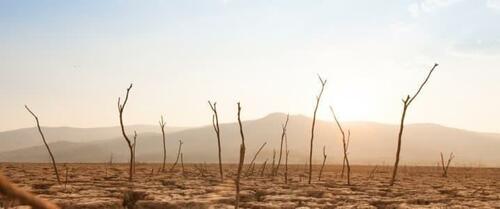Authored by Kurt Cobb via Resource Insights,
A recent piece in New Scientist has reminded me that it is a myth that humans, if they are wise and clever enough, can learn to “manage” the biosphere.
The piece is about the unfortunate trade-off between pollution reduction and global warming. It has been known for some time that successful efforts to reduce air pollution have resulted in fewer particles in the atmosphere, particles that reflect sunlight back into space. This reduction has actually accelerated global warming even as it has improved air quality and reduced illness and death.
The warning in the New Scientist piece comes from imagining a scenario in which world governments somehow agree on global action to curb warming climate by “spraying reflective particles into the stratosphere that dim the sun. The strategy works: temperatures at ground level stabilise, and life goes on as normal despite escalating carbon dioxide concentrations in the atmosphere.”
But then in 2050:
[S]omething goes wrong. The spray guns break down, the money runs out, a pandemic hits or a global war disrupts operations. Whatever the case, the planet starts to heat up, fast, as years of pent-up emissions kick into effect. Ecosystems can’t cope, wildlife perishes en masse, societal chaos ensues.
The phenomenon is called “termination shock.”
The piece explains that we’ve been experiencing something like a termination shock because efforts in the last two decades to reduce air pollution have been so successful. The result has been temperature warming faster than anticipated, unexpected regional changes such as increases in tropical cyclones, and increased monsoons responsible for greater flooding. One researcher said that effects of a termination shock caused by a sudden cessation of worldwide program that inserts large amounts of reflective particles in the atmosphere would be much worse than what we are seeing today.
Read the entire piece New Scientist for the complete list of horribles.
Having recently re-read James Lovelock’s Gaia: A New Look at Life on Earth I was reminded of some key points he makes about attempts to manage the biosphere.
Before getting to those points, for those who are unfamiliar with Lovelock and his Gaia Theory, it goes something like this: The Earth can be seen as a single organism using its natural processes that involve both living and nonliving materials to maintain conditions favorable to life. He calls this system Gaia after the Greek goddess of the Earth.
(I can recommend the book which is highly readable for the layperson.)
Lovelock’s key points for my purposes here are that humans are a part of this Gaian system just like all other Earthly beings and that we have our role to play in keeping conditions favorable to life. The idea that humans could manage such a complex system is almost laughable to Lovelock who notes:
There can be no prescription, no set of values, for living within Gaia. For each of our different actions there are only consequences.
Earlier in the book Lovelock states:
Each time we significantly alter part of some natural process of regulation or introduce some new source of energy or information, we are increasing the probability that one of these changes will weaken the stability of the entire system, by cutting down the variety of response.
Two possible negative outcomes he mentions are runaway positive feedback and sustained oscillation.
-
Runaway positive feedback could over time move Earth’s climate permanently into one resembling that of Venus where surface temperatures can melt lead.
-
Sustained oscillation could cause the Earth to cycle quickly between an ice age climate and a tropical one.
Lovelock notes that modern peoples live mostly in cities and so focus on solving problems that arise between individual people and between people and the urban institutions they create, not the problems that arise between people and the natural world they inhabit.
This puts humans at an increasing disadvantage in attempting to determine how best to live within Gaia over the long term.
Views expressed in this article are opinions of the author and do not necessarily reflect the views of ZeroHedge.
Loading recommendations…


















